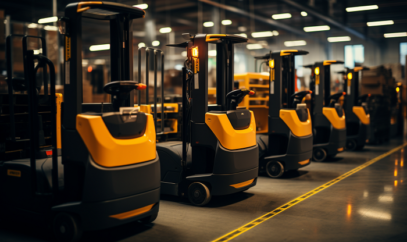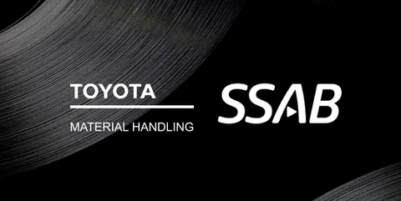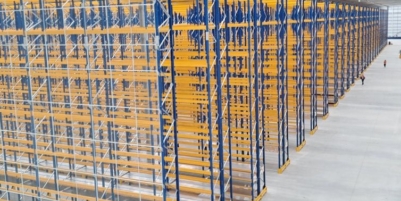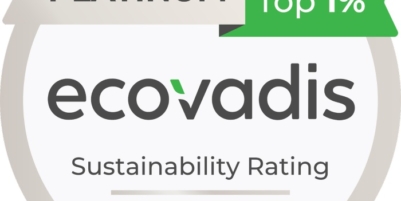-
Nutrivend selects Forterro’s Orderwise to support online expansion and streamline operations - April 11, 2025
-
ARROWXL LAUNCHES AMBITIOUS ZERO WASTE ROADMAP - April 8, 2025
-
THE BCMPA’S NEW CAMPAIGN DRIVES OUTSOURCING SUCCESS IN Q1 - April 7, 2025
-
BLACKOUT TECHNOLOGIES TARGETS TELEMATICS-INTEGRATED MOBILE DEVICE BLOCKING TO COMBAT SMARTPHONE DISTRACTION - April 1, 2025
-
Sparck Technologies awarded Royal designation - March 27, 2025
-
OpenADR Alliance announces first OpenADR 3.0 certified products with EVoke Systems, E.ON Energy and Universal Devices - March 25, 2025
-
Growing fulfilment and contract packer appoints new Managing Director - March 25, 2025
-
When is it time to invest in a WMS? Understanding the key trigger points - March 25, 2025
-
eCapital helps Vantage Recruitment on its journey to financial success - March 24, 2025
-
Hugo Beck Celebrates 70 Years of Packaging Innovation with Open House Events - March 20, 2025
In the ever-evolving world of logistics and warehousing, efficiency, safety, and cost-effectiveness are of paramount importance. Forklifts, the workhorses of warehouses, have undergone considerable transformation over the years, and one of the most significant advancements has been the transition to lithium-ion (Li-ion) powered forklifts. These modern machines offer numerous advantages over traditional lead-acid counterparts, making them an increasingly popular choice among warehouse operators. Here, we delve into the numerous benefits of lithium-ion forklifts.
1. Faster Charging Times:
Li-ion batteries are renowned for their rapid charging capabilities. Traditional lead-acid batteries often require 8-12 hours for a full charge, while lithium-ion alternatives can be recharged to full capacity within 1-2 hours. This feature significantly reduces downtime, ensuring forklifts spend more time moving goods and less time sitting idle.
2. Opportunity Charging:
Unlike lead-acid batteries which typically require full charge-discharge cycles to maximise lifespan, Li-ion batteries benefit from opportunity charging. This means they can be intermittently charged during breaks or downtimes without negatively impacting their longevity. This flexibility can be a game-changer in maintaining constant workflow in bustling warehouses.
3. Longer Lifespan:
Li-ion batteries generally have a longer operational life than their lead-acid counterparts. With proper maintenance and charging, a lithium-ion battery can last up to 3-5 times longer than traditional batteries, representing substantial cost savings in the long run.
4. Reduced Maintenance:
Lead-acid batteries require periodic maintenance involving checking and refilling water levels, cleaning terminals, and ensuring adequate ventilation due to gaseous emissions during charging. In contrast, Li-ion batteries are virtually maintenance-free. They neither require water top-ups nor emit harmful gases, reducing both labour and infrastructure costs associated with their upkeep.
5. Energy Efficiency:
Lithium-ion forklifts offer better energy efficiency than traditional models. They convert more of the stored energy into power for the forklift, leading to lower energy consumption. This translates to reduced electricity bills and a smaller carbon footprint for the warehouse.
6. Improved Performance and Consistency:
Lithium-ion powered forklifts offer consistent performance throughout their charge cycle. Unlike lead-acid batteries that might witness a drop in efficiency as they deplete, Li-ion batteries maintain consistent power output, ensuring the forklift operates at optimal levels until the battery is almost entirely drained.
7. Lighter Weight:
Li-ion batteries are generally lighter than lead-acid batteries. This weight difference can translate to increased efficiency as the forklift may handle loads with greater ease and speed.
8. Safety Enhancements:
Li-ion forklifts eliminate the risks associated with handling the sulfuric acid in lead-acid batteries. Additionally, there’s no risk of spillage, gas emissions, or corrosive damage. Modern Li-ion batteries also come equipped with advanced management systems that protect against overcharging, overheating, and deep discharging, ensuring safe operations.
9. Environmental Benefits:
Li-ion batteries are environmentally friendly compared to lead-acid batteries. They have a longer lifespan, which means fewer batteries end up in landfills. They also eliminate the toxic hazards posed by lead and acid leakages, contributing to a greener, safer planet.
10. Space Saving:
Given that lithium-ion batteries do not require extensive charging infrastructure and can be charged more frequently, warehouses can potentially save space previously dedicated to large charging stations.
In conclusion, the transition to lithium-ion forklifts represents a strategic move for warehouses aiming to boost their operational efficiency, reduce costs, and adopt sustainable practices. As technology continues to advance, it’s clear that Li-ion powered machines will be at the forefront of warehouse operations for years to come.
































